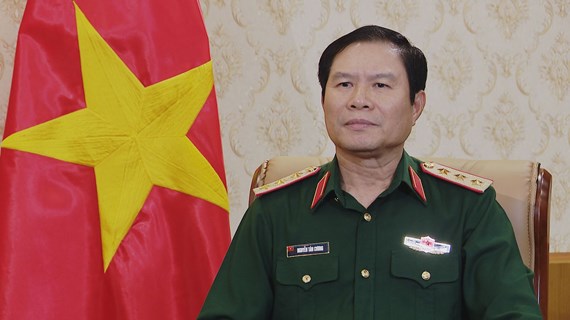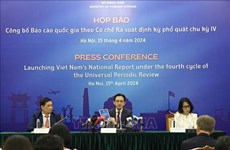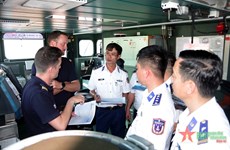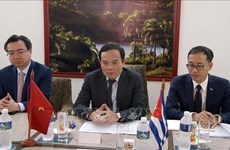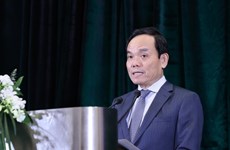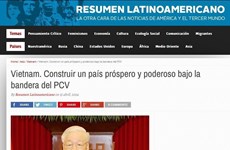FM writes about Vietnam-UN cooperation
FM Pham Binh Minh has written an article on the developments in VN-UN relations.
On the 35th anniversary of Vietnam-UN relations, Foreign Minister Pham
Binh Minh has written an article on the outstanding developments in
Vietnam-UN relations and Vietnam’s efforts to make active and
responsible contributions to the UN activities.
Vietnam officially became the 149 th member of the UN, the world’s biggest multilateral organisation, on September 20, 1977. This began a new chapter in Vietnam’s multilateral diplomacy and was essential for the success of the country’s renewal process and national construction and defence. This helped raise the nation’s position in the international arena and later Vietnam successfully completed its stint as a non-permanent member of the UN Security Council during the 2008-2009 term.
Over the past 35 years, Vietnam-UN relations have developed in every field ranging from culture, socio-education, economics and trade to security and politics. This includes jointly carrying out national and regional programmes and working together to settle global issues. The following are main points in the history of Vietnam-UN relations.
The UN is an important multilateral forum for the Vietnamese Party and State to successfully carry out their foreign policy.
Vietnam has always pursued a foreign policy of independence, self-reliance, peace, openness, multilateralisation and willingness to have a diverse range of international relationships. Vietnam has now become a trusted and responsible friend and partner of the international community.
Vietnam’s leaders have attended and put forward their views on UN policies, high-level UN delegations and representatives, including UN Secretary Generals Kofi Annan in 2006 and Ban Ki-moon in 2010.
Through these high-level contacts, Vietnam has promoted cooperation with its partners as well as international forums such as ASEAN, the Asia-Pacific Economic Cooperation (APEC), the Asia-Europe Meeting (ASEM), the Francophone Community and the Non-Aligned Movement.
Having recognised Vietnam ’s contributions to the UN, member states have elected the country to the organisation’s leading positions such as Vice President of the UN General Assembly, President of the UN Food and Agriculture Organisation Council, member of the UN Economic and Social Council (ECOSOC) and the UN Human Rights Committee.
When Vietnam was elected as a non-permanent member of the Security Council, its success in the role was highlighted by the UN General Secretary and many member states. This also helped raise the nation’s prestige and international position and confirmed the Vietnamese Party and State’s sound external policy.
Vietnam is an active member of the UN and constantly strives to make active and responsible contributions to the UN’s operations.
On peace and security, Vietnam , which has suffered from wars in the recent past, always supports the UN’s primary goals of maintaining peace and international security, preventing an arms race, preventing and settling international disputes and conflicts by peaceful means and increasing friendship amongst nations.
Vietnam has become a member of international treaties on weapons of mass destruction, the war against terrorism and works closely with the UN and others countries on these issues.
It was elected as a rotary President of the conference on disarmament in early 2009. At present, the country is preparing to take part in UN peacekeeping operations (PKO) in line with Vietnam ’s policies and capabilities.
In the region, Vietnam has raised its voice on issues relating to peace, stability and cooperation, helping turn Southeast Asia into a region of peace, friendship and cooperation, free of nuclear weapons and in the process of establishing a strong ASEAN Community.
In the fields of cooperation and development, the UN has highlighted that Vietnam has completed many of its UN Millennium Development Goals (MDGs) ahead of schedule. It has always been eager to share its experiences when carrying out UN action programmes on social development, environment, food security, housing, human rights, population, women, children, and in combating HIV/AIDS. To contribute to reforming the UN’s development system, Vietnam became one of eight pilot countries to implement the action unity initiative in 2006 and this initiative is being successfully implemented in the country.
At UN forums, Vietnam has actively joined in discussions to resolve issues of common concern relating socio-economics, culture, humanity and ensuring human rights, and contributed to the reform of UN agencies in a transparent, democratic and efficient way.
As President of the UN Security Council in July 2009, Vietnam for the first time put forth an initiative to consult other UN member states on the UN Security Council’s annual report and this was praised by other countries. To make further contributions to UN activities, Vietnam is actively mobilising support for its candidacy to the UN Human Rights Council for the 2014-2016 tenure, ECOSOC for the 2016-2018 tenure, and the UN Security Council for the 2020-2012 tenure.
The UN has also been essential for Vietnam’s construction and development process.
UN agencies have always accompanied Vietnam’s national development plans and programmes. UN aid has met Vietnam ’s demands to surmount its socio-economic difficulties left by the war, especially in education, healthcare, the protection and care of mothers and children and family planning.
In the past 15 years, the UN’s development system continues to assist Vietnam in various fields in the country’s renewal and modernisation and industrialisation. This includes ensuring sustainable development, increasing the capacity of international integration, enhancing legal institutions and administrative reforms, eradicating hunger and reducing poverty as well as coping with social issues, including drugs, HIV/AIDS, epidemics and natural disasters.
The relationship between Vietnam and UN agencies continues to be consolidated with a number of specific projects and programmes in fields that are commensurate with Vietnam’s demands such as economic policy consultations (UNDP), food security (FAO, IFAD), health protection (WHO, UNAIDS), and the environment and climate change (UNDP, UNEP).
UN agencies provide millions of USD in aid to Vietnam annually and its capital, knowledge and experiences are important for Vietnam ’s socio-economic development achievements, especially in implementing its MDGs.
Early this year, Vietnam and the UN signed a bilateral cooperation plan in three major fields for the 2012-2016 period, and this that reflects the strong commitments to cooperation between Vietnam and the UN. The fields are sustainable development, the enhancement of access to fundamental quality services, social welfare, and promoting public administration to help Vietnam implement its socio-economic development strategy for the 2011-2020 period and its socio-economic development plan for the 2011-2015 period.
In the coming years, Vietnam will increase its diplomatic activities and work with the UN to promote its international integration, which helps maintain a peaceful environment favourable for speeding up industrialisation and modernisation, safeguarding independence, sovereignty and territorial integrity and raising the country’s prestige and the struggle for peace, national independence, democracy and social progress in the world.-VNA
Vietnam officially became the 149 th member of the UN, the world’s biggest multilateral organisation, on September 20, 1977. This began a new chapter in Vietnam’s multilateral diplomacy and was essential for the success of the country’s renewal process and national construction and defence. This helped raise the nation’s position in the international arena and later Vietnam successfully completed its stint as a non-permanent member of the UN Security Council during the 2008-2009 term.
Over the past 35 years, Vietnam-UN relations have developed in every field ranging from culture, socio-education, economics and trade to security and politics. This includes jointly carrying out national and regional programmes and working together to settle global issues. The following are main points in the history of Vietnam-UN relations.
The UN is an important multilateral forum for the Vietnamese Party and State to successfully carry out their foreign policy.
Vietnam has always pursued a foreign policy of independence, self-reliance, peace, openness, multilateralisation and willingness to have a diverse range of international relationships. Vietnam has now become a trusted and responsible friend and partner of the international community.
Vietnam’s leaders have attended and put forward their views on UN policies, high-level UN delegations and representatives, including UN Secretary Generals Kofi Annan in 2006 and Ban Ki-moon in 2010.
Through these high-level contacts, Vietnam has promoted cooperation with its partners as well as international forums such as ASEAN, the Asia-Pacific Economic Cooperation (APEC), the Asia-Europe Meeting (ASEM), the Francophone Community and the Non-Aligned Movement.
Having recognised Vietnam ’s contributions to the UN, member states have elected the country to the organisation’s leading positions such as Vice President of the UN General Assembly, President of the UN Food and Agriculture Organisation Council, member of the UN Economic and Social Council (ECOSOC) and the UN Human Rights Committee.
When Vietnam was elected as a non-permanent member of the Security Council, its success in the role was highlighted by the UN General Secretary and many member states. This also helped raise the nation’s prestige and international position and confirmed the Vietnamese Party and State’s sound external policy.
Vietnam is an active member of the UN and constantly strives to make active and responsible contributions to the UN’s operations.
On peace and security, Vietnam , which has suffered from wars in the recent past, always supports the UN’s primary goals of maintaining peace and international security, preventing an arms race, preventing and settling international disputes and conflicts by peaceful means and increasing friendship amongst nations.
Vietnam has become a member of international treaties on weapons of mass destruction, the war against terrorism and works closely with the UN and others countries on these issues.
It was elected as a rotary President of the conference on disarmament in early 2009. At present, the country is preparing to take part in UN peacekeeping operations (PKO) in line with Vietnam ’s policies and capabilities.
In the region, Vietnam has raised its voice on issues relating to peace, stability and cooperation, helping turn Southeast Asia into a region of peace, friendship and cooperation, free of nuclear weapons and in the process of establishing a strong ASEAN Community.
In the fields of cooperation and development, the UN has highlighted that Vietnam has completed many of its UN Millennium Development Goals (MDGs) ahead of schedule. It has always been eager to share its experiences when carrying out UN action programmes on social development, environment, food security, housing, human rights, population, women, children, and in combating HIV/AIDS. To contribute to reforming the UN’s development system, Vietnam became one of eight pilot countries to implement the action unity initiative in 2006 and this initiative is being successfully implemented in the country.
At UN forums, Vietnam has actively joined in discussions to resolve issues of common concern relating socio-economics, culture, humanity and ensuring human rights, and contributed to the reform of UN agencies in a transparent, democratic and efficient way.
As President of the UN Security Council in July 2009, Vietnam for the first time put forth an initiative to consult other UN member states on the UN Security Council’s annual report and this was praised by other countries. To make further contributions to UN activities, Vietnam is actively mobilising support for its candidacy to the UN Human Rights Council for the 2014-2016 tenure, ECOSOC for the 2016-2018 tenure, and the UN Security Council for the 2020-2012 tenure.
The UN has also been essential for Vietnam’s construction and development process.
UN agencies have always accompanied Vietnam’s national development plans and programmes. UN aid has met Vietnam ’s demands to surmount its socio-economic difficulties left by the war, especially in education, healthcare, the protection and care of mothers and children and family planning.
In the past 15 years, the UN’s development system continues to assist Vietnam in various fields in the country’s renewal and modernisation and industrialisation. This includes ensuring sustainable development, increasing the capacity of international integration, enhancing legal institutions and administrative reforms, eradicating hunger and reducing poverty as well as coping with social issues, including drugs, HIV/AIDS, epidemics and natural disasters.
The relationship between Vietnam and UN agencies continues to be consolidated with a number of specific projects and programmes in fields that are commensurate with Vietnam’s demands such as economic policy consultations (UNDP), food security (FAO, IFAD), health protection (WHO, UNAIDS), and the environment and climate change (UNDP, UNEP).
UN agencies provide millions of USD in aid to Vietnam annually and its capital, knowledge and experiences are important for Vietnam ’s socio-economic development achievements, especially in implementing its MDGs.
Early this year, Vietnam and the UN signed a bilateral cooperation plan in three major fields for the 2012-2016 period, and this that reflects the strong commitments to cooperation between Vietnam and the UN. The fields are sustainable development, the enhancement of access to fundamental quality services, social welfare, and promoting public administration to help Vietnam implement its socio-economic development strategy for the 2011-2020 period and its socio-economic development plan for the 2011-2015 period.
In the coming years, Vietnam will increase its diplomatic activities and work with the UN to promote its international integration, which helps maintain a peaceful environment favourable for speeding up industrialisation and modernisation, safeguarding independence, sovereignty and territorial integrity and raising the country’s prestige and the struggle for peace, national independence, democracy and social progress in the world.-VNA





